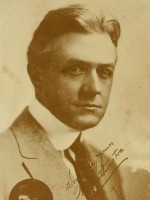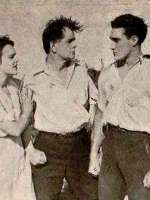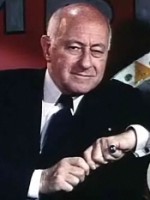Sessue Hayakawa is a Actor, Director, Story and Producer Japonais born on 10 june 1889 at Chiba (Japon)

Sessue Hayakawa (早川 雪洲, Hayakawa Sesshū, June 10, 1889 – November 23, 1973) was a Japanese Issei actor who starred in American, Japanese, French, German, and British films. Hayakawa was active at the outset of the American film industry. He was the first Asian actor to find stardom in the United States and Europe. He is the first Asian American as well as the first Japanese American movie star and the first Asian American leading man. His "broodingly handsome" good looks and typecasting as a sinister villain with sexual dominance made him a heartthrob among American women, and the first male sex symbol of Hollywood, several years in advance of Rudolph Valentino.
During those early years, Hayakawa was as well known and as popular as Charlie Chaplin and Douglas Fairbanks, although today his name is largely unknown to the public.
His popularity, sex appeal, and extravagant lifestyle (e.g., his wild parties and his gold-plated Pierce-Arrow) may have fed tension within segments of American society which was already filled with feelings of the "yellow peril". While at the time Chinese actors were treated in a demasculinized way, Hayakawa's example directly contrasts with this. However, with the rising tensions with Japan, Japanese actors were no longer welcome in Hollywood. Following the end of the war, Asian characters were depicted in a desexualized fashion, something that continues to today in Modern Hollywood and in the wider society, as exemplified by the controversial character of I.Y. Yunioshi in Breakfast At Tiffany's. Hayakawa refused to adopt the negative stereotypes. He abandoned Hollywood for European cinema and there he was treated equally. Hayakawa's friendships with American actors led him to return to Hollywood. He was one of the highest paid stars of his time, earning $5,000 per week in 1915, and $2 million per year through his own production company during the 1920s. He starred in over eighty movies, and two of his films stand in the United States National Film Registry. Of his English-language films, Hayakawa is probably best known for his role as Colonel Saito in the film The Bridge on the River Kwai, for which he received a nomination for Academy Award for Best Supporting Actor in 1957. He also appeared in the 1950 film Three Came Home and as the pirate leader in Disney's Swiss Family Robinson in 1960.
In addition to his film acting career, Hayakawa was a theatre actor, film and theatre producer, film director, screenwriter, novelist, martial artist, member of the French Resistance, and a Zen master.
While filming The Jaguar's Claws, in the Mojave Desert, Hayakawa played a Mexican bandit, with 500 cowboys as extras. On the first night of filming, the extras drank all night and well into the next day. No work was being done, so Hayakawa challenged the group to a fight. Two men stepped forward. Hayakawa said of the incident, "The first one struck out at me. I seized his arm and sent him flying on his face along the rough ground. The second attempted to grapple and I was forced to flip him over my head and let him fall on his neck. The fall knocked him unconscious." Hayakawa then disarmed yet another cowboy. The extras returned to work, amused by the way the small man manhandled the big bruising cowboys.
Source : Wikidata
Sessue Hayakawa

- Infos
- Photos
- Best films
- Family
- Characters
- Awards
Birth name Kintarō Hayakawa
Nationality Japon
Birth 10 june 1889 at Chiba (Japon)
Death 23 november 1973 (at 84 years) at Tokyo (Japon)
Nationality Japon
Birth 10 june 1889 at Chiba (Japon)
Death 23 november 1973 (at 84 years) at Tokyo (Japon)
Sessue Hayakawa (早川 雪洲, Hayakawa Sesshū, June 10, 1889 – November 23, 1973) was a Japanese Issei actor who starred in American, Japanese, French, German, and British films. Hayakawa was active at the outset of the American film industry. He was the first Asian actor to find stardom in the United States and Europe. He is the first Asian American as well as the first Japanese American movie star and the first Asian American leading man. His "broodingly handsome" good looks and typecasting as a sinister villain with sexual dominance made him a heartthrob among American women, and the first male sex symbol of Hollywood, several years in advance of Rudolph Valentino.
During those early years, Hayakawa was as well known and as popular as Charlie Chaplin and Douglas Fairbanks, although today his name is largely unknown to the public.
His popularity, sex appeal, and extravagant lifestyle (e.g., his wild parties and his gold-plated Pierce-Arrow) may have fed tension within segments of American society which was already filled with feelings of the "yellow peril". While at the time Chinese actors were treated in a demasculinized way, Hayakawa's example directly contrasts with this. However, with the rising tensions with Japan, Japanese actors were no longer welcome in Hollywood. Following the end of the war, Asian characters were depicted in a desexualized fashion, something that continues to today in Modern Hollywood and in the wider society, as exemplified by the controversial character of I.Y. Yunioshi in Breakfast At Tiffany's. Hayakawa refused to adopt the negative stereotypes. He abandoned Hollywood for European cinema and there he was treated equally. Hayakawa's friendships with American actors led him to return to Hollywood. He was one of the highest paid stars of his time, earning $5,000 per week in 1915, and $2 million per year through his own production company during the 1920s. He starred in over eighty movies, and two of his films stand in the United States National Film Registry. Of his English-language films, Hayakawa is probably best known for his role as Colonel Saito in the film The Bridge on the River Kwai, for which he received a nomination for Academy Award for Best Supporting Actor in 1957. He also appeared in the 1950 film Three Came Home and as the pirate leader in Disney's Swiss Family Robinson in 1960.
In addition to his film acting career, Hayakawa was a theatre actor, film and theatre producer, film director, screenwriter, novelist, martial artist, member of the French Resistance, and a Zen master.
Biography
On May 1, 1914, Hayakawa married fellow Japanese actress Tsuru Aoki, who co-starred in several of his movies. Hayakawa's first child, a son, was born in New York in 1929, to a white actress named Ruth Noble. The boy was known as Alexander Hayes, but the name was changed to Yukio after Sessue and his wife Tsuru adopted the child and took him to be raised and educated in Japan. Later, Hayakawa had two daughters: Yoshiko, an actress, and Fujiko, a dancer. Aoki died in 1961, after which Hayakawa moved back to Japan and became a Zen master. Hayakawa was known for his discipline and martial arts skills. While a student at the University of Chicago, he played quarterback for the football team and was once penalized for using jujitsu to bring down an opponent.While filming The Jaguar's Claws, in the Mojave Desert, Hayakawa played a Mexican bandit, with 500 cowboys as extras. On the first night of filming, the extras drank all night and well into the next day. No work was being done, so Hayakawa challenged the group to a fight. Two men stepped forward. Hayakawa said of the incident, "The first one struck out at me. I seized his arm and sent him flying on his face along the rough ground. The second attempted to grapple and I was forced to flip him over my head and let him fall on his neck. The fall knocked him unconscious." Hayakawa then disarmed yet another cowboy. The extras returned to work, amused by the way the small man manhandled the big bruising cowboys.
Best films
Usually with
Filmography of Sessue Hayakawa (71 films)
Actor

The Daydreamer (1966)
, 1h41Directed by Jules Bass
Origin USA
Genres Drama, Science fiction, Fantasy, Adventure, Musical, Animation
Themes Mermaids in film, Musical films, Children's films
Actors Paul O'Keefe, Jack Gilford, Ray Bolger, Margaret Hamilton, Burl Ives, Sessue Hayakawa
Roles The Mole (voice)
Rating60%





It is early in the 19th century. The thirteen-year-old Hans Christian Andersen (called "Chris" for short; portrayed and voiced by Paul O'Keefe) is known in his native village of Odense, Denmark, as an incurable daydreamer. Actually, the boy's reveries are an escape from the hardships of his family's life.

Swiss Family Robinson (1960)
, 2h8Directed by Ken Annakin
Origin USA
Genres Drama, Action, Adventure
Themes Seafaring films, Transport films, Pirate films, Films based on Robinson Crusoe, Children's films, Disaster films, Films about seafaring accidents or incidents
Actors John Mills, Dorothy McGuire, James MacArthur, Janet Munro, Sessue Hayakawa, Tommy Kirk
Roles Kuala, Pirate Chief
Rating70%





A family on their way to New Guinea is chased by pirates into a storm. The captain and crew abandon the ship leaving the family shipwrecked off an uninhabited island. Father (John Mills) and his two eldest sons Fritz and Ernst (Tommy Kirk and James MacArthur) salvage as much as they can from the wreck including livestock, tools, and even an organ. As they gather what can be removed from the ship, the pirates return and begin shooting at the ship. Fritz and Ernst begin readying the ship's cannon, but they only have one shot. Suddenly, the pirates turn around; Father has put up a flag indicating the ship is under quarantine and that there is Black Death aboard. The three men construct a tree house home on the island while the youngest boy Francis (Kevin Corcoran) investigates the wildlife and starts an impressive collection of animals including a young elephant, a capuchin monkey and two Great Danes rescued from the ship which they name Duke and Turk. Mother (Dorothy McGuire) prays to be rescued. The boys, particularly Ernst, also build inventions to provide modern amenities to the family such as drawing water and preserving food.
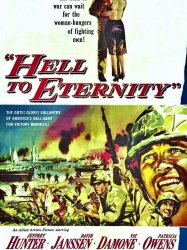
Hell to Eternity (1960)
, 2h11Directed by Phil Karlson
Origin USA
Genres Drama, War
Themes Seafaring films, Prison films, Transport films, Political films
Actors Jeffrey Hunter, David Janssen, Patricia Owens, Richard Eyer, John Larch, Bill Williams
Roles General Matsui
Rating68%





In Depression-era Los Angeles, Guy Gabaldon gets into a fight at school when another boy snitches about his breaking into a grocery store. After Japanese-American Kaz Uni (the brother of Guy's friend George) finds out Guy's mother is in the hospital and his father is dead, he invites Guy to stay with his family. As Kaz's parents speak little English, Guy begins to learn Japanese. Then, when Guy's mother dies, the Unis adopt him. He becomes especially close to Kaz's mother.

Green Mansions (1959)
, 1h44Directed by Mel Ferrer
Origin USA
Genres Drama, Adventure, Romance
Themes Indiens d'Amazonie
Actors Anthony Perkins, Audrey Hepburn, Lee J. Cobb, Sessue Hayakawa, Henry Silva, Nehemiah Persoff
Roles Runi
Rating53%





A young man named Abel (Anthony Perkins) narrowly escapes Caracas, Venezuela after it is overtaken by rebels. He decides to seek revenge, as his father, the former Minister of War, was killed. After getting supplies, he takes a canoe to the far shore, where he is nearly killed by a leopard, but is saved by the native, Indian-like people.

The Geisha Boy (1958)
, 1h30Directed by Frank Tashlin
Origin USA
Genres Comedy
Themes Military humor in film, Films about magic and magicians, Seafaring films, Transport films
Actors Jerry Lewis, Sessue Hayakawa, Marie McDonald, Suzanne Pleshette, Barton MacLane, Nobu McCarthy
Roles Mr. Sikita
Rating63%





The Great Wooley (Jerry Lewis) is a magician who is entertaining GIs in Japan. Upon their arrival, he causes a series of unfortunate mishaps for the headliner, actress Lola Livingston (Marie McDonald), including tearing her dress, knocking her down a flight of stairs, and rolling her up in the red carpet. An orphan, Mitsuo Watanabe (Robert Hirano) witnesses the spectacle and laughs for the first time since his parents died. When his aunt Kimi Sikita (Nobu McCarthy) brings the boy to Wooley to thank him, he and the boy become close, which irritates the aunt's boyfriend, a Japanese baseball player, as well as a USO liaison (Suzanne Pleshette) who has fallen for Wooley.

The Bridge on the River Kwai (1957)
, 2h41Directed by David Lean
Origin United-kingdom
Genres Drama, War, Adventure, Historical
Themes Seafaring films, Pont, Prison films, Transport films, Rail transport films, Political films, Évasion
Actors William Holden, Alec Guinness, Jack Hawkins, Sessue Hayakawa, James Donald, Percy Herbert
Roles Col. Saito
Rating80%





In World War II, British prisoners arrive by train at a Japanese prison camp in Burma. The commandant, Colonel Saito (Sessue Hayakawa), informs them that all prisoners, regardless of rank, are to work on the construction of a railway bridge over the River Kwai that will connect Bangkok and Rangoon. The senior British officer, Lieutenant Colonel Nicholson (Alec Guinness), reminds Saito that the Geneva Conventions exempt officers from manual labour.

House of Bamboo (1955)
, 1h42Directed by Samuel Fuller
Origin USA
Genres Drama, Crime
Themes Seafaring films, Transport films, Children's films
Actors Robert Ryan, Robert Stack, Cameron Mitchell, Yoshiko Yamaguchi, Brad Dexter, Sessue Hayakawa
Roles Inspector Kito
Rating67%





In 1954, a military train guarded by American soldiers and Japanese police is attacked as it travels between Kyoto and Tokyo. During the raid, which is carried out with great precision, an American sergeant is killed, and the train's cargo of guns and ammunition is stolen. The crime is investigated by Capt. Hanson, an American, and Japanese police inspector Kita, who, five weeks later, are concerned when a thief named Webber is shot with some of the stolen bullets. As Webber lies dying in a Tokyo hospital, he is questioned by Hanson and Kita, and although Webber was left for dead by his gang during a thwarted robbery, he refuses to implicate his cohorts, who presumably are responsible for the earlier crime. Webber, who is also an American, does reveal, however, that he is secretly married to a Japanese woman named Mariko. Among Webber's possessions is a letter from an American named Eddie Spanier, who wants to join Webber in Japan after his release from a U.

Three Came Home (1950)
, 1h40Directed by Jean Negulesco
Origin USA
Genres Drama, War
Themes Seafaring films, Prison films, Films about sexuality, Transport films, Erotic films, Sexploitation films, Political films, Women in prison films, Children's films
Actors Claudette Colbert, Patric Knowles, Florence Desmond, Sessue Hayakawa, Helen Westcott, Jerry Fujikawa
Roles Colonel Michio Suga
Rating72%





American-born Agnes Keith (Colbert) and her British husband Harry Keith (Patric Knowles) live a cushioned colonial life in North Borneo with their young son George in 1942. Keith is the only American in Sandakan. Worried about the rumors surrounding Japanese invasion, Harry asks Agnes if she would leave for the United States along with George. Agnes replies that she would send George but not go herself. In the meantime, the Pearl Harbor attack takes place. Japanese soldiers led by Colonel Suga (Sessue Hayakawa) capture the place. Suga is fluent in English and has read a book on Borneo authored by Mrs. Keith. During the Japanese invasion of Sandakan, Agnes has a miscarriage. Europeans living there are moved to prison camps. Harry lives in the camp meant for men while George and Agnes live in another camp. After a few days, women and children are taken to another camp.
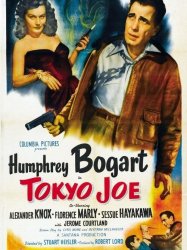
Tokyo Joe (1949)
, 1h28Directed by Stuart Heisler
Origin USA
Genres Drama, Thriller, Crime, Romance
Themes Transport films, Aviation films, Political films
Actors Humphrey Bogart, Sessue Hayakawa, Alexander Knox, Teru Shimada, Florence Marly, Harold Goodwin
Roles Baron Kimura
Rating62%





After World War II, ex-serviceman Joe Barrett (Humphrey Bogart) returns to Tokyo to see if there is anything left of his pre-war bar and gambling joint ("Tokyo Joe's") after all the bombing. Amazingly, it is more or less intact and being run by his old friend Ito (Teru Shimada). Joe is shocked to learn from Ito that his wife Trina (Florence Marly), who he thought had died in the war, is still alive. Believing her to be dead, Joe inadvertently deserts her and she has divorced Joe and is now married to Mark Landis (Alexander Knox), a lawyer working in the U.S. Occupation HQ. She has a seven-year-old child, Joe's daughter Anya (Lora Lee Michel), born when Trina was in an internment camp after Joe's departure from Japan just before Pearl Harbor.
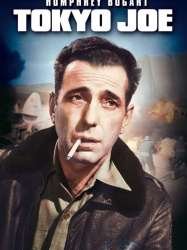
Tokyo Joe (1949)
, 1h28Directed by Stuart Heisler
Genres Drama, Thriller, Crime
Actors Humphrey Bogart, Alexander Knox, Sessue Hayakawa, Florence Marly, Jerome Courtland, Gordon Jones
Roles Baron Kimura
Rating62%





L'action du film se déroule dans le contexte du Japon d'après-guerre. Joe Barrett retourne à Tokyo où il tenait un bar, le Tokyo Joe's.
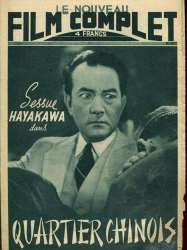
Quartier chinois (1947)
, 1h30Directed by René Sti, Jean Bastia
Origin France
Genres Drama, Crime
Actors Michèle Alfa, Sessue Hayakawa, Alfred Adam, Paul Azaïs, Robert Pizani
Roles Tchang
Sur fond de trafic d'opium, une chanteuse dont un policier est amoureux est enlevée.

Le Cabaret du Grand Large (1946)
, 1h30Directed by René Jayet
Origin France
Genres Crime
Actors Sessue Hayakawa, Fernand Fabre, Antonin Berval, Suzy Prim, Charles Lemontier, Lucien Hector
Roles Professeur Wang
De louches trafics s'opèrent derrière la porte de ce cabaret. Le chef de bande est l'Asiatique Wang épié par le commissaire Thomas. Un certain Richard mène double jeu et, par amour pour la tenancière, finit par abattre Wang tandis que la police cerne les gangsters.

Le Soleil de minuit (1943)
, 1h28Directed by Bernard Roland
Origin France
Genres Adventure, Melodrama
Actors Jules Berry, Josseline Gaël, Saturnin Fabre, Sessue Hayakawa, Aimé Clariond, Marcel Vallée
Roles Matsui
Rating59%





Fiche technique

Malaria (1943)
, 1h30Directed by Jean Gourguet
Origin France
Genres Drama
Actors Mireille Balin, Sessue Hayakawa, Jacques Dumesnil, Alexandre Rignault, Jean Debucourt, Michel Vitold
Roles Saïdi
Dans la brousse, un lieutenant retrouve un ménage qu'il a jadis fréquenté. La femme ne supporte pas l'atmosphère fiévreuse du pays, le mari est un rude colon. Un mystérieux indigène des îles surprend les rapports entre le lieutenant et Madame Barral. Le lieutenant tente de le supprimer. Le mari décide de quitter cette terre inhospitalière...

Gambling Hell (1942)
, 1h30Directed by Jean Delannoy
Origin France
Genres Drama, Thriller, Adventure
Actors Erich von Stroheim, Sessue Hayakawa, Mireille Balin, Henri Guisol, Pierre Renoir, Louise Carletti
Roles Ying Tchaï
Rating65%





À Macao où sont concentrés les lieux de plaisir et le trafic d'armes, un drame oppose un aventurier et sa fille qu'il a fait élever dans l'ignorance de son métier. Elle est arrachée à son milieu et sauvée de la tragédie par un jeune journaliste qui l'aime.
 Connection
Connection

